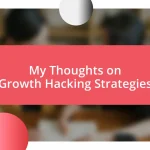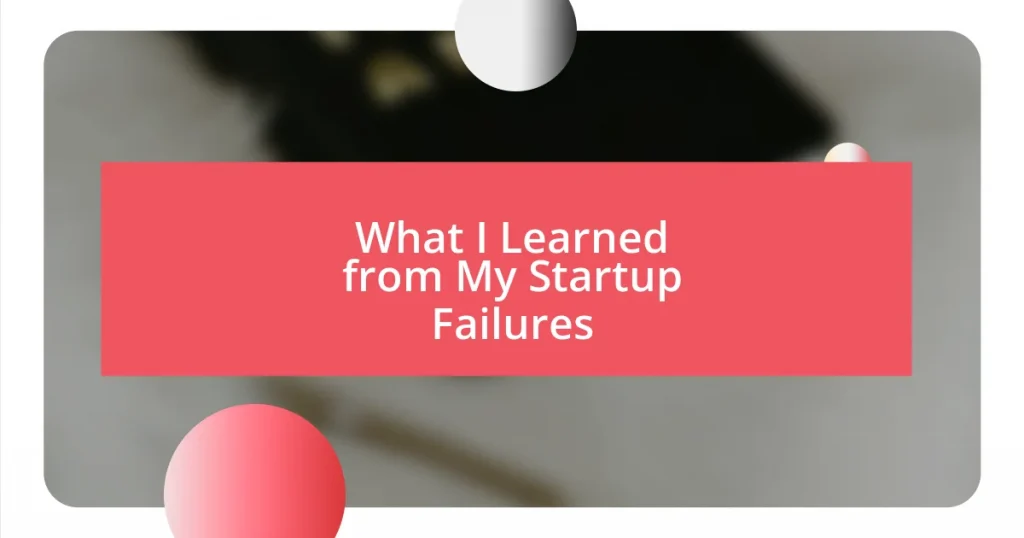Key takeaways:
- Failure is an opportunity for growth; reflecting on setbacks provides valuable lessons and equips entrepreneurs with resilience for future ventures.
- Common reasons for startup failures include lack of clear vision, failure to adapt to market needs, and financial instability, emphasizing the importance of listening to users and having a solid financial plan.
- Building resilience involves self-reflection, nurturing a positive mindset, and engaging with a supportive network, transforming failures into stepping stones for success.
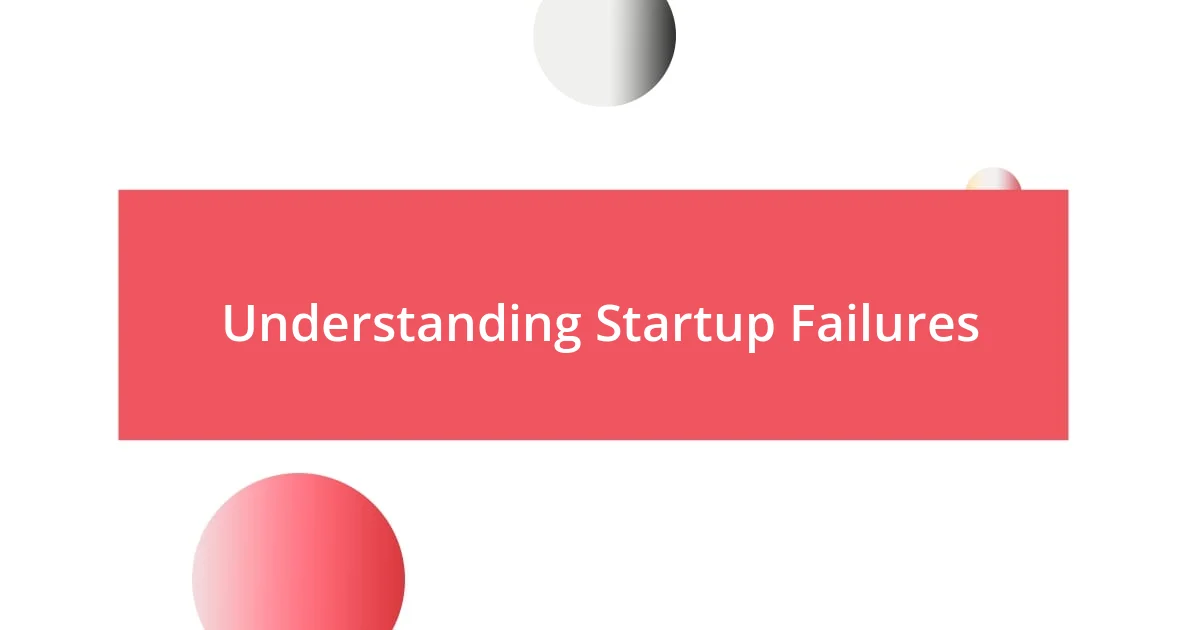
Understanding Startup Failures
Startup failures are more common than many like to admit, and understanding this reality is crucial. I remember the first time my startup hit a wall; it felt like my whole world was collapsing. I was left with a whirlwind of emotions—confusion, frustration, and a sense of loss. Have you ever poured your heart into something only to watch it crumble? That realization can be incredibly disheartening.
But failure isn’t just a setback; it’s an opportunity for growth. In my experience, I learned that each stumble presents valuable lessons waiting to be unwrapped. Reflecting on what went wrong, I found that many issues stemmed from a lack of market research or miscommunication within my team. Aren’t we all a bit guilty of assuming we know better than the market sometimes?
Moreover, the emotional rollercoaster of startup failures can be isolating. It’s easy to feel like you’re the only one facing such challenges. I often wondered if others shared my experience, and I discovered that many entrepreneurs do. The key is to embrace these failures as part of the journey. Embracing the lessons learned from each failure equips you to approach your next venture with newfound wisdom and resilience.
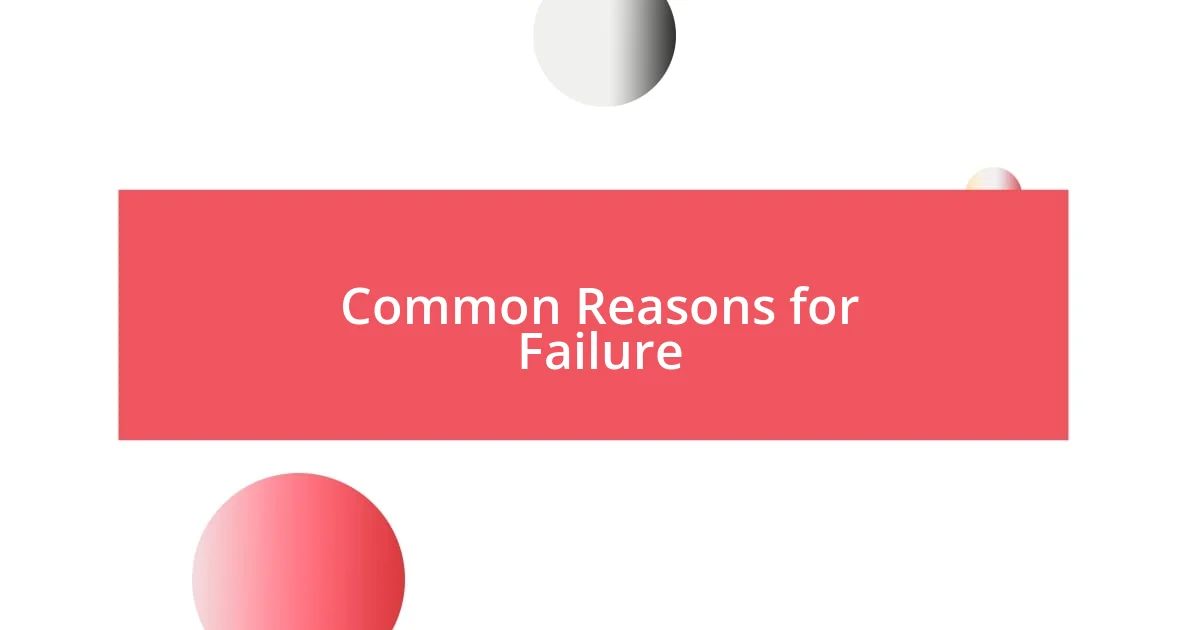
Common Reasons for Failure
In my journey through startups, I’ve seen firsthand how a lack of clear vision can lead to chaos. I recall a project where we thought we could pivot our product based on a single feedback from a friend. That naive approach not only wasted time but also misled our entire team. It’s crucial to have a well-defined mission and to stick with it, especially when the entrepreneurial waters get choppy.
Another common pitfall I’ve encountered is the failure to adapt to market needs. I remember launching an app that I was convinced was revolutionary. To my dismay, after gathering user feedback, I realized we’d missed the mark entirely. Engaging with customers regularly and being willing to adjust based on their needs could have saved a lot of heartache. The lesson here? Always listen to your users; they hold the key to your success.
Lastly, funding issues are a frequent reason for startup failures. There was a point when I found myself scrambling for cash, thinking I’d manage everything on a shoestring budget. The stress of financial instability is immense, often leading to poor decisions. Having a solid financial plan and understanding your cash flow can be the difference between thriving and simply surviving.
| Reason for Failure | Impact |
|---|---|
| Lack of Clear Vision | Leads to chaos and misalignment within the team. |
| Failure to Adapt to Market Needs | Results in products that don’t meet user expectations or demands. |
| Funding Issues | Creates financial instability and can lead to rushed, poor decisions. |
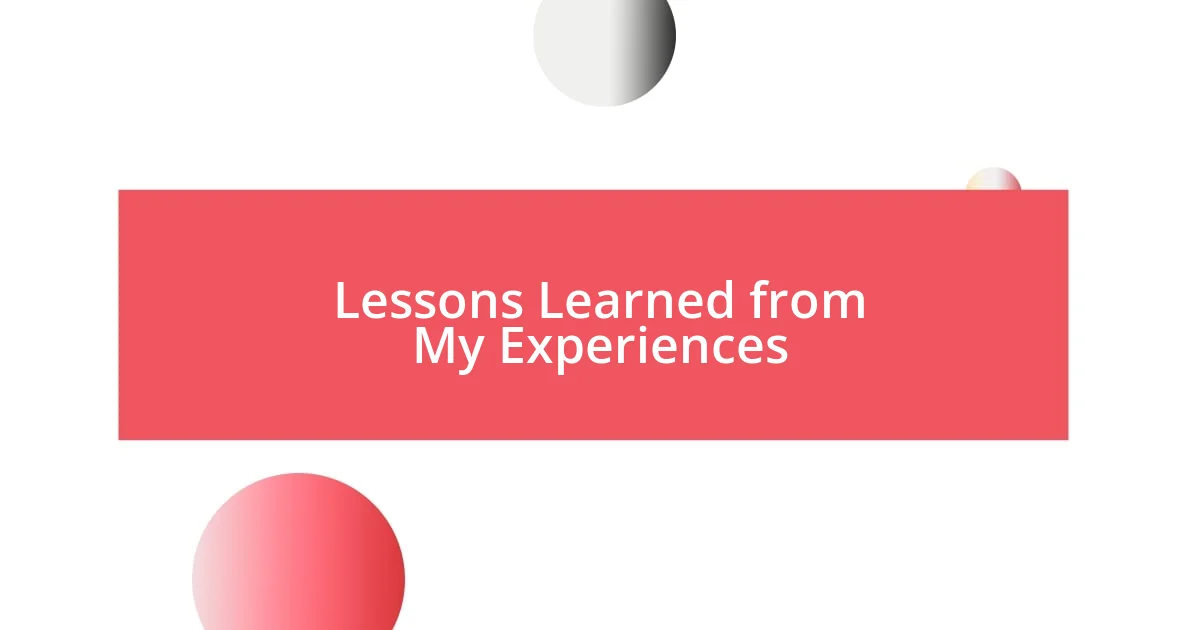
Lessons Learned from My Experiences
I’ve come to discover that resilience is one of the most valuable lessons from my startup failures. Each setback pushed me to identify my weaknesses and build upon them. I remember one particularly tough moment when my marketing strategy flopped spectacularly, leaving us with minimal traction. It stung at first, but it forced me to pivot quickly and explore new avenues, like engaging directly with our audience. That experience reinforced my belief: adaptability is crucial in navigating the unpredictable waters of entrepreneurship.
Here are some key lessons I’ve learned along the way:
- Embrace Feedback: Seek constructive criticism actively; it guiding me toward improvement instead of dismissing it as negativity.
- Prioritize Team Communication: After a failure rooted in poor communication, I realized that aligning everyone on the team’s vision was paramount.
- Risk and Reward Balance: Some of my biggest failures stemmed from taking risks without thorough analysis, teaching me to weigh pros and cons carefully before diving in.
- Accepting Imperfection: I learned to accept that not every idea will be a hit, which has made the journey less daunting and more fulfilling.
- Cultivating a Growth Mindset: Viewing failures as stepping stones rather than static endpoints reshaped my approach to challenges, making them less personal and more about collective learning.
By sharing these lessons, I hope to illuminate the path for others who find themselves grappling with the uncertainties of their entrepreneurial journeys.
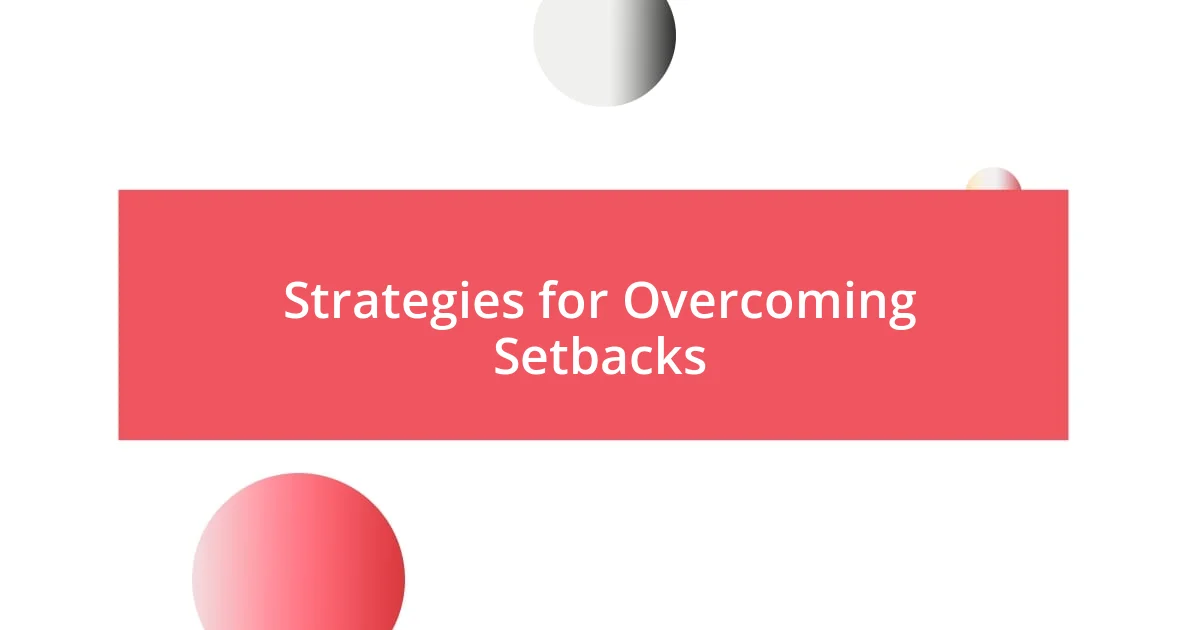
Strategies for Overcoming Setbacks
When setbacks hit, I’ve learned to take a step back and assess the situation calmly. I remember a time when a major partnership fell through just days before a big launch. At first, it felt like a punch to the gut, but I quickly realized that I needed to focus on solutions instead of sulking. I pulled my team together to brainstorm alternatives and innovate quickly, reminding myself that flexibility is key to overcoming obstacles.
In my experience, reframing setbacks as opportunities for growth has been a game changer. I recall a moment when a project I was passionate about was met with complete indifference by users. Instead of giving in to frustration, I used that experience to engage directly with potential customers. Their insights helped reshape our approach and provided clarity on what the market truly wanted. Isn’t it fascinating how feedback can transform failures into stepping stones for future success?
Building a strong support network has been another crucial strategy for me. There was a challenging period when I felt isolated, navigating the ups and downs of my startup journey. I decided to reach out to fellow entrepreneurs and mentors to share experiences and advice. This collaboration not only helped me feel supported but also sparked new ideas. Connecting with others in the same boat can create a safety net of encouragement and shared wisdom, making setbacks much more manageable.
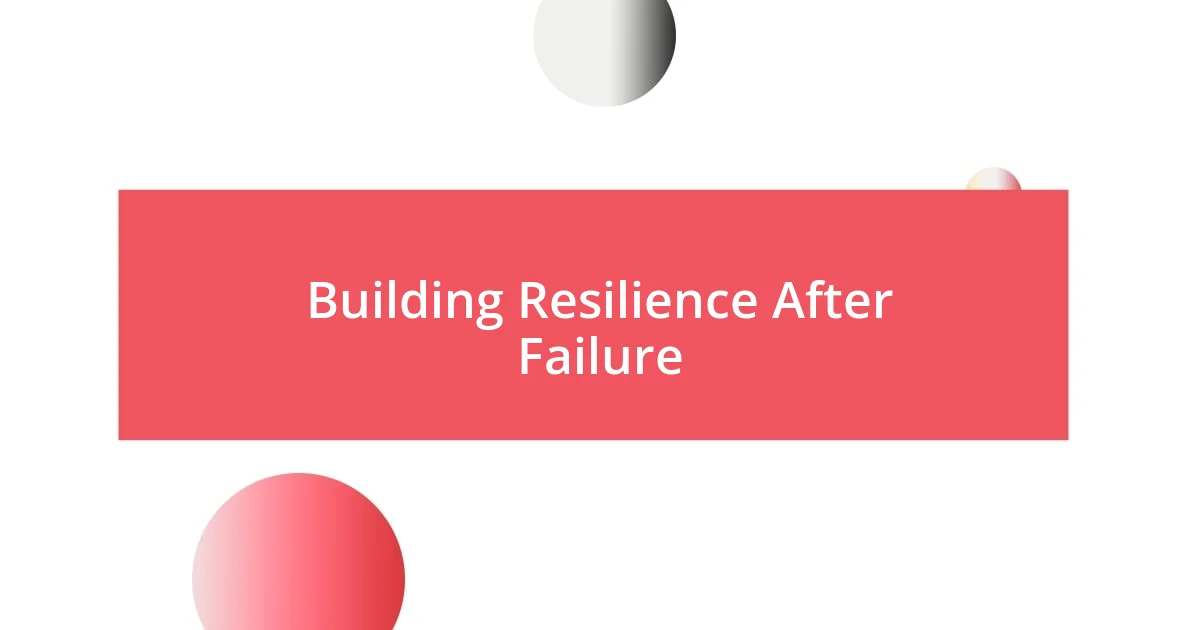
Building Resilience After Failure
Building resilience after failure is a journey that often requires self-reflection and a willingness to learn. For me, it was during a particularly tough phase when I lost a significant investor right before a crucial funding round. The initial shock felt like a hammer to my confidence, but it led me to double down on understanding my business model better. I spent nights analyzing what went wrong and how to articulate my vision more compellingly. This process revealed both vulnerabilities and strengths I never knew I had, transforming that experience into a foundation for resilience.
I often ask myself, how can failure teach us if we’re not willing to listen? One day, after a major product launch flop, I took a quiet walk in the park to sort through my thoughts. It was there, surrounded by nature, that I reflected on my feelings of disappointment. I realized that those emotions are valid—they’re part of being human. Instead of letting them consume me, I transformed them into a drive to seek feedback and iterate. It’s a powerful reminder that our failures often contain the seeds for the next success, if only we’re willing to dig a little deeper.
Moreover, I’ve learned the importance of nurturing a positive inner dialogue. There was a time I let negative self-talk take over after a failed partnership. It felt disheartening, almost paralyzing. But I consciously made an effort to shift that narrative. I started journaling my challenges and victories, celebrating even the smallest wins. This practice reinforced the understanding that resilience isn’t just about bouncing back; it also involves celebrating progress, no matter how incremental. Isn’t it liberating to think that each small step adds up to monumental growth?

Applying Insights for Future Success
It’s fascinating how I’ve learned to extract valuable lessons from tricky situations. For instance, after a product iteration that fell flat, I took the time to gather my team for an open discussion. This wasn’t just about pointing fingers; it became a moment for vulnerability. By acknowledging what went wrong and how we felt about it, we created a transparent environment that allowed us to brainstorm fresh ideas. Have you ever experienced a moment like this, where honesty led to innovation?
Reflecting on these experiences taught me that adaptability is essential. During one of my startup’s rough patches, I had to pivot our business model completely. This was daunting, but it pushed me to consider new perspectives and opportunities I hadn’t noticed before. As I stood at that crossroads, I realized that sometimes the unexpected paths are where the most growth occurs. Isn’t it intriguing how change can often be the catalyst for success?
Lastly, I learned the significance of setting realistic goals based on past experiences. After a setback that seemed insurmountable, I made a habit of breaking my objectives down into smaller, attainable steps. This not only made my progress more manageable but also helped track improvement without feeling overwhelmed. I still remember that feeling of joy when I achieved a small goal after that rough patch. It’s amazing how the little victories can motivate us to keep pushing forward, isn’t it?
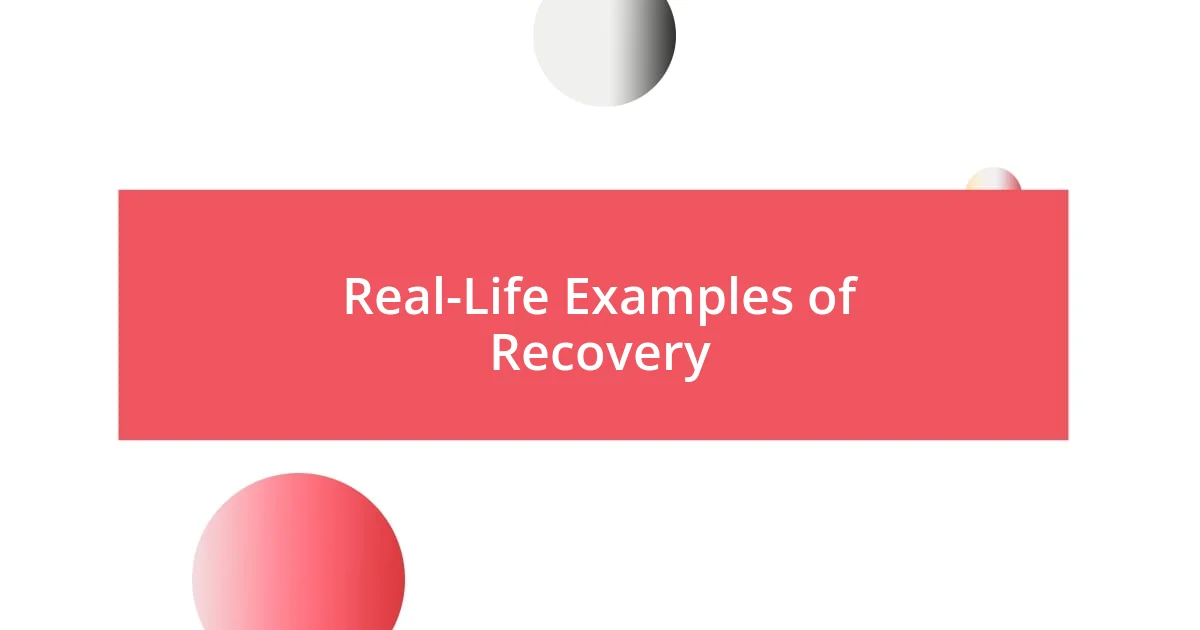
Real-Life Examples of Recovery
After one particularly tough setback, I decided to reach out to other entrepreneurs who had also faced failures. Over coffee, we shared our war stories, and it was eye-opening to realize I wasn’t alone in this journey. I remember one founder recounting how a failed launch pushed them to refine their target audience. Their vulnerability inspired me to embrace my own setbacks as stepping stones rather than setbacks. Have you ever found that opening up about struggles has allowed you to grow stronger connections?
The time I had to close a venture still stings, but it also led to a surprising transformation. I took a month to deliberately disconnect, spending time on personal projects I had shelved away. This period of reflection helped me rediscover my passion for coding—something that reignited my creativity. Isn’t it fascinating how stepping back can reveal new passions and directions that we often overlook when buried in the hustle?
Revisiting old projects can be bittersweet. I once dusted off an idea I had abandoned in frustration. When I revisited it with fresh eyes, I realized the initial feedback I’d received had merit. My emotional response had clouded my judgment, and now, I could see the potential I’d missed before. This experience has taught me that recovery doesn’t just stem from moving forward; sometimes, it involves looking back with newfound wisdom. How often do we challenge ourselves to revisit and reimagine ideas that once seemed hopeless?



